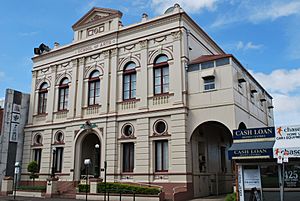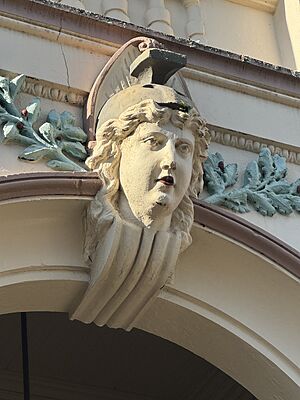Maryborough School of Arts facts for kids
Quick facts for kids Maryborough School of Arts |
|
|---|---|

Maryborough School of Arts, 2008
|
|
| Location | 427 Kent Street, Maryborough, Fraser Coast Region, Queensland, Australia |
| Design period | 1870s–1890s (late 19th century) |
| Built | 1887–1888; Groundbreaking: 3 June 1887; Opened: 21 May 1888 |
| Architect | John Harry Grainger |
| Architectural style(s) | Classicism |
| Owner | Fraser Coast Regional Council |
| Official name: School of Arts, Maryborough School of Arts, Museum, Technical College and Recreation Club | |
| Type | state heritage (built) |
| Designated | 21 October 1992 |
| Reference no. | 600701 |
| Significant period |
|
| Significant components | School of Arts |
| Builders | Jacob and John Rooney |
| Lua error in Module:Location_map at line 420: attempt to index field 'wikibase' (a nil value). | |
The Maryborough School of Arts is a special old building in Maryborough, Australia. It was designed by John Harry Grainger and built between 1887 and 1888 by Jacob & John Rooney. This building is important because it was a place for learning and community activities for many years.
It is a two-story building made of brick, located across the street from the City Hall. It replaced an earlier, smaller School of Arts building from 1861.
Contents
What the Building Looks Like
The Maryborough School of Arts is a smooth brick building with a sloped roof. Its main front, facing Kent Street, looks very balanced and uses a classic style.
Above the main entrance, there's a plaster carving of Minerva. She was a Roman goddess known for wisdom and protecting cities.
Inside, the building has a large main hall. Rooms are on both sides of this hall on the ground floor. The main entrance has fancy double wooden doors.
A Look Back at History
The Maryborough School of Arts was built between 1887 and 1888. It was designed by John Grainger, an architect from Melbourne and Adelaide. This large new building replaced an older, smaller one built in 1861.
Why Schools of Arts Were Important
In the 1800s, "Schools of Arts" were created all over Queensland. These places were like community centers for learning. They offered classes for adults and had public libraries. The idea came from a movement in Britain that wanted to help people, especially workers, get more education. They taught useful skills and trades, and also offered cultural learning. These schools were often the first step towards what we now call technical colleges.
The first Maryborough School of Arts building was opened in 1861. It was a brick building with a simple design. The Queensland Government often helped these schools by giving them land or money. The land for the Maryborough School of Arts was in Kent Street, where the building still stands today.
Building the New School of Arts
By the 1880s, the town needed a bigger and better School of Arts. In 1884, some of the land was sold to help pay for a new building.
Architects were invited to submit designs for the new building. John Grainger's design was chosen in 1886. He designed a grand two-story brick building with a classic look. This style was popular for public buildings because it made them look important and traditional.
Local builders, Jacob and John Rooney, started construction on March 1, 1887. The foundation stone was laid in a special ceremony on June 3, 1887. The building was finished and opened on May 21, 1888.
What Was Inside
The new building was much larger and offered more services.
- The library, with over 5,000 books, was on the ground floor.
- There were also two large classrooms.
- On the first floor, there was a reading room and a smoking room.
- Later in 1888, a local person named Janet Melville gave money to start a museum in the building. Glass display cases were put in the foyer and reading room, filled with items like wood samples, minerals, art, and stuffed animals.
Growing and Changing
In 1890, the Maryborough School of Arts started teaching technical classes in art and science. These classes became very popular and eventually led to the creation of the Maryborough Technical College. Because of this growth, a wooden classroom extension was added to the back of the building in 1895.
In 1896, a verandah (a covered porch) was added to the eastern side of the building. This gave people a shady place to relax, especially during hot summer months. More extensions were added over the years, including another lecture hall. A Recreation Club with billiard tables was also set up in one of the back buildings.
In 1907, a special gallery was added to the library. This was a wooden balcony inside the room, allowing more bookshelves to be added all the way up to the ceiling.
A New Chapter for Education
By 1910, the Maryborough Technical College became a separate organization, even though it was still in the School of Arts building. Later, in 1936, the Technical College moved to its own new buildings at the Maryborough State High School.
After the 1920s, the government started giving less money to Schools of Arts. The building was then used by other community groups, like the Country Women's Association. During World War II, the building was used by the Australian Comforts Fund and became a club for members of the RAAF stationed in Maryborough.
After the war, the library continued on the ground floor, but the first floor was rented out to different groups. In 1949, the Australian Broadcasting Company (ABC) and the Post Master General's Department (PMG) moved into the first floor. The ABC even set up a radio broadcasting studio there.
Becoming a Public Library
In 1972, the Maryborough City Council took over the management of the School of Arts building and land. The School of Arts Committee continued to run the library until a new public library was opened. The Maryborough Public Library opened in May 1977, and the library at the School of Arts closed.
Today, the Maryborough Wide Bay and Burnett Historical Society uses the building as their home.
What Makes It Special
The Maryborough School of Arts is listed on the Queensland Heritage Register. This means it's recognized as an important historical place.
- It shows how education changed: The building helps us understand how adult education in Queensland grew from local community efforts in the 1800s to state-run programs later on.
- It's a great example of its kind: It's a typical example of a large regional School of Arts building, with its classic design, reading room, library, and classrooms. Even though Schools of Arts are not as common now, this building shows what an important role they once played in towns.
- It looks beautiful: The building's front is well-designed and stands out on Kent Street. Inside, it has lovely wooden details, plasterwork, and well-sized rooms.
- It's important to the community: For over a hundred years, this building was a public place for learning and community activities. It was the start of both the current public library and the technical college, making it very special to the people of Maryborough.
 | Leon Lynch |
 | Milton P. Webster |
 | Ferdinand Smith |


